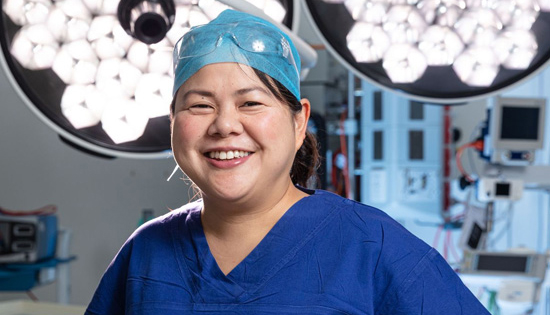Benign Breast Conditions Specialist in Sydney
Not all breast conditions are cancerous. Mastalgia, or breast soreness, is extremely common, and very rarely a sign of breast cancer. Fibroadenomas and cysts are 2 common causes of non-cancerous breast lumps. A nipple discharge can occur for many reasons, and although it is not usually a sign of cancer, it is important that you see a doctor to establish the cause. Mastitis is an infection of the breasts, which often occurs in breastfeeding women, and gynaecomastia is the enlargement of the breasts in males.
All of these conditions can be managed by your breast Specialists at Sydney Surgical Clinic.
Fibroadenoma
What is a fibroadenoma?
A fibroadenoma is the most common type of non-cancerous breast lump. Also known as a “breast mouse”, a fibroadenoma tends to move around freely when touched. It is typically felt as a smooth, firm, round lump. Fibroadenomas are common in young women, and may grow over time, especially during pregnancy.
How is a fibroadenoma diagnosed?
The diagnosis of a fibroadenoma is confirmed via needle biopsy, following a mammogram or ultrasound.
What is the treatment of a fibroadenoma?
Not all fibroadenomas require surgical removal. During your appointment at Sydney Surgical Clinic, the Specialists will answer your questions and discuss treatment with you.


Mastalgia
What is mastalgia?
Mastalgia, or breast soreness, is extremely common – most women will experience breast soreness at some point in their lives. Mastalgia may be related to your menstrual cycle. For some women, mastalgia can be debilitating.
I have sore breasts – is that a sign of breast cancer?
Breast soreness is not usually caused by breast cancer. However, it is important to see your doctor if you have any concerns about your breasts.
What can I do to treat sore breasts?
Most treatments for sore breasts have not been scientifically proven, but some women find it helpful to:
- wear a well-fitting bra that provides adequate support
- take simple painkillers such as paracetamol and anti-inflammatories when needed
- reduce caffeine intake
- stop smoking
- take an evening primrose oil supplement daily
If you’ve tried all these treatments without avail, you should see your specialist at Sydney Surgical Clinic. They may prescribe medication to help manage your breast pain.
Mastitis
What is mastitis?
Mastitis is an infection of the breast. Left untreated, mastitis may progress to a breast abscess, with the formation of pus. Women with mastitis experience red, painful and swollen breasts. Fevers and chills are not uncommon. Mastitis usually occurs in breastfeeding mothers, but it is possible to develop mastitis even if you are not breastfeeding.
What will happen during my consultation for mastitis?
Your Sydney Surgical Clinic Specialist will see you and conduct a thorough history and examination. They may also arrange investigations, including a mammogram or breast ultrasound, to check for any underlying breast conditions.
In most cases, mastitis is easily treated with antibiotics. If there is a collection of pus (breast abscess), you may need to have the fluid drained, either with a needle or a small operation. Your Specialists will assist you with advice on how to continue breastfeeding, if needed.
Breast cyst
I recently had a mammogram/ultrasound which showed a breast cyst. What does that mean?
A breast cyst is a sac of fluid within the breast. Breast cysts are extremely common, especially if you are premenopausal or on hormone replacement therapy. They may cause symptoms such as a breast lump or tenderness. Breast cysts do require assessment by a doctor, but most will not require further treatment.
Can a breast cyst be breast cancer?
Occasionally, a breast cyst can be a sign of underlying breast cancer. This is why all breast cysts should be assessed by your doctor.

Nipple discharge
What causes a nipple discharge?
There are many causes of nipple discharge. These include hormonal disorders or side-effects of medications. Breast duct ectasia is a non-cancerous condition, with enlarged milk ducts seen on breast imaging, resulting in a greenish nipple discharge.
However, it is important to consult a doctor if you experience any form of nipple discharge, as it could be a sign of an underlying breast tumour in some cases.
I’ve noticed some fluid discharge from my nipple, what things should I look out for?
If you consult your Sydney Surgical Clinic Specialists for nipple discharge, it would be helpful if you could describe:
- The colour of the discharge.
- The origin of the discharge. Does it come from multiple or single ducts, and is the discharge only from one, or both breasts?
- Whether the discharge is spontaneous or occurs only when the breast is squeezed.
How is nipple discharge treated?
Treatment depends on the cause of nipple discharge. In some cases, treatment may include a small operation to remove the nipple duct.
Gynaecomastia
What is gynaecomastia?
Gynaecomastia is excessive enlargement of the breast tissue in males. It can occur in one or both breasts. Gynaecomastia can be caused by the onset of puberty, or be due to hormonal disorders, liver disease or certain medications. Some men find gynaecomastia quite distressing.
What can I expect during my consultation for gynaecomastia?
Your Specialist will take a history and perform a detailed examination. They may refer you for investigations to determine the cause of your gynaecomastia.
Is there a treatment for gynaecomastia?
An operation can be performed to remove the excess breast tissue. Risks include asymmetry and a poor cosmetic result. For this reason, it is preferable that your surgery is performed by a specialist breast surgeon.
As Specialist Breast Surgeons, Dr Lim and Dr Abraham have managed thousands of benign and malignant breast conditions. You can expect professional, patient-centred care as you consult with them over your breast concerns.




